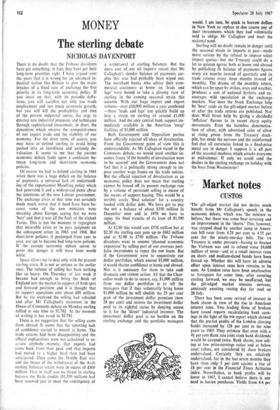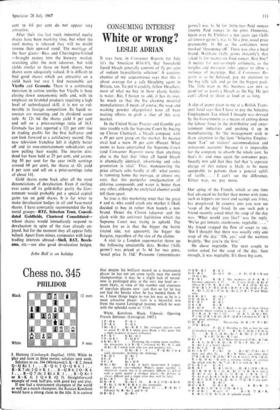- Market notes
CUSTOS
(The gilt-edged market did not derive much 'benefit from Mr Callaghan's speech in the economic debate, which was 'the mixture as before,' but there was some bear covering and an improvement in the 'shorts.' This, however, was stopped dead by another jump in Ameri- can bill rates from 4.24 per cent to 4.55 per cent for the ninety-one-day bills. The us -Treasury is under pressure—having to finance the Vietnam war and to refund some $9,600 million of notes—and as a result interest rates on short- and medium-dated bonds have been forced up. Whether this will have an adverse effect upon interest rates here remains to be seen. As London rates have been unattractive to foreigners for some time, after covering sterling forward, we may be unaffected, but the gilt-edged market remains nervous, anxiously awaiting vesting day for steel on 28 July.
There has been some revival of interest in bank shares in view of the rise in American interest rates. Two leading firms of brokers have issued reports recalculating bank earn- ings in the light of the its report which showed that the pre-tax profits of the London clearing banks increased by 128 per cent in the nine years to 1965. They estimate that even with a per cent Bank rate joint stock bank dividends would be covered twice. Bank shares, now sell- ing at low price-earnings ratios and at below asset values, are considered by these brokers undervalued. Certainly they are relatively undervalued, for in the last seven months they have risen only 5 per cent against a rise of 18 per cent in the Financial Times Actuaries index. Nevertheless, as bank profits will be lower in 1967, I cannot believe there is any need to hasten purchases. Yields from 4.4 per
cent to 4.6 per cent do not appear very attractive.
After their rise last week industrial equity shares have been marking time, but when the steel money is released they will no doubt resume their upward trend. The marriage of the beer giants—Bass and Charrington-United —brought money into the brewery market, searching after the next takeover, but with yields similar to those on bank shares, beer shares seem adequately valued. It is difficult to find good shares which are attractive on a yield basis but two I find reasonable are Viyella and Granada. There is a continuing recession in cotton textiles but Viyella is busy closing down uneconomic mills and, with its emphasis on branded products requiring a high level of technological skill, it is not so vul- nerable to foreign competition. Its liquid re- sources are mounting and its dividend seems safe. At 12s 6d the shares yield 6 per cent and sell on a price-earnings ratio of 16.5. Granada has just reported a 121- per cent rise in trading profits for the first half-year and can look forward to a satisfactory second. The new television franchise left it slightly better off and its non-entertainment subsidiaries are now pulling their weight. The interim divi- dend has been held at 25 per cent, and assum- ing 50 per cent for the year (with earnings around 60 per cent), the shares at 42s yield 6 per cent and sell on a price-earnings ratio of about 14f.
Gold shares came back after all the stout denunciations of devaluation. Even if sterling ever came off its gold-dollar parity the Gov- ernment would probably put a special capital gains tax on gold shares. It is far wiser to make devaluation hedges in oil and base-metal shares. I have constantly recommended the big metal groups—RTZ, Selection Trust, Consoli- dated Goldfields, Chartered Consolidated— whose shares would immediately respond to devaluation in spite of the rises already en- joyed. but for the moment they all appear fully valued. Apart from mines, companies with large trading interests abroad—Shell, BAT, Beech- ams, etc.—are also good devaluation hedges.
John Bull is on holiday































 Previous page
Previous page